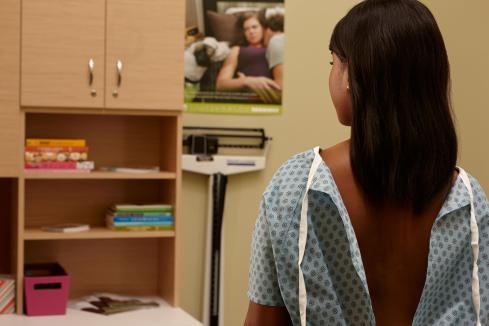Here’s How to Celebrate Cervical Health Awareness Month

The best prevention of HPV infection is vaccination before sexual activity.
January is both Cervical Health Awareness Month, and from the 24th to the 30th, HPV Awareness Week. Let’s take a few minutes to better understand HPV, the health risks, and what everyone can do to prevent HPV infections. If you have specific questions you’d like answered, make an appointment to talk to a provider at your nearest The Right Time health center.
WHAT IS HPV?
Human papillomavirus (HPV) is one of the most common viruses out there. Around 80% of people in the U.S. will be exposed to and get an HPV infection during their life.
Most HPV infections do not cause any symptoms. There are more than 150 strains of HPV in total, but only about 40 strains are transmitted to the genitals—vagina, cervix, penis, anus—and throat during sexual contact. Some strains of HPV are commonly referred to as “high-risk” because they increase the risk of certain types of cancer, including cancer of the cervix, vagina, and vulva; cancer of the penis; cancer of the anus; and cancer of the throat.
HOW TO PREVENT HPV?
The best prevention of HPV infection is vaccination before sexual activity. Getting the vaccine protects people from nine strains of HPV—6, 11, 16, 18, 31, 33, 45, 52, and 58. These strains include the high-risk strains that are most likely to cause cancer as well as the low-risk strains that cause genital warts. While the HPV vaccine is recommended for all sexually active people up to age 45, even people who have been diagnosed or exposed to HPV should still get the vaccine, as it can protect them from other strains that they may not have been exposed to.
Since HPV is passed between people anytime there is skin-to-skin contact, using barrier methods, such as condoms, internal condoms, and dental dams, can decrease, but does not eliminate, the risk of HPV transmission.
SPREAD THE WORD!
While HPV vaccination rates were increasing before the pandemic, more than half of young people in the US had not completed their HPV vaccine series and less than 40% of adults have ever received a single dose. Due to the pandemic, many people are skipping recommended preventative care, such as vaccinations, so the number of young people who are vaccinated against HPV is likely to decrease even further. So, in addition to taking steps to decrease your personal risk of HPV related cancers, celebrate Cervical Health Awareness month by talking to friends, family, and social networks to spread the word about the importance of HPV vaccination.
Updated December 2021
Related Content


Article
What Does “Dual Protection” Birth Control Mean?It usually means using a condom along with another birth control method.

Article
January is Cervical Cancer Awareness Month: What to Know About HPV and ScreeningA positive HPV test can feel scary, but healthcare providers at your nearest The Right Time clinic can help.

Article
Own Your Well-Being in 2026 with These 3 Sexual Health ResolutionsFirst: prioritize preventative sexual and reproductive health care.



















